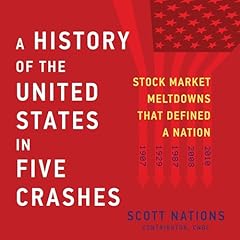
The Death of the Banker
The Decline and Fall of the Great Financial Dynasties and the Triumph of the Small Investor
No se pudo agregar al carrito
Add to Cart failed.
Error al Agregar a Lista de Deseos.
Error al eliminar de la lista de deseos.
Error al añadir a tu biblioteca
Error al seguir el podcast
Error al dejar de seguir el podcast
 Exclusivo para miembros Prime: ¿Nuevo en Audible? Obtén 2 audiolibros gratis con tu prueba.
Exclusivo para miembros Prime: ¿Nuevo en Audible? Obtén 2 audiolibros gratis con tu prueba.Compra ahora por $14.66
-
Narrado por:
-
Michael Kramer
-
De:
-
Ron Chernow
With the same breadth of vision and narrative élan he brought to his monumental biographies of the great financiers, Ron Chernow examines the forces that made dynasties like the Morgans, the Warburgs, and the Rothschilds the financial arbiters of the early 20th century and then rendered them virtually obsolete by the century's end. As he traces the shifting balance of power among investors, borrowers, and bankers, Chernow evokes both the grand theater of capital and the personal dramas of its most fascinating protagonists. Here is Siegmund Warburg, who dropped a client in the heat of a takeover deal because the man wore monogrammed shirt cuffs, as well as the imperious J. P. Morgan, who, when faced with a federal antitrust suit, admonished Theodore Roosevelt to "send your man to my man and they can fix it up". And here are the men who usurped their power, from the go-getters of the 1920s to the masters of the universe of the 1980s. Glittering with perception and anecdote, The Death of the Banker is at once a panorama of 20th-century finance and a guide to the new era of giant mutual funds on Wall Street.
©1997 Ron Chernow (P)2017 HighBridge, a division of Recorded BooksLos oyentes también disfrutaron:




















Las personas que vieron esto también vieron:


















A small but effective book
Se ha producido un error. Vuelve a intentarlo dentro de unos minutos.
A bit out of date
Se ha producido un error. Vuelve a intentarlo dentro de unos minutos.
Note copyright/printing date
Se ha producido un error. Vuelve a intentarlo dentro de unos minutos.
Excellent
Se ha producido un error. Vuelve a intentarlo dentro de unos minutos.
I get the broad outlines of Chernow's thesis, and the handy bar graph he creates to illustrate it is so simple, even I can imagine it without the help of a picture on a page. But Chernow's familiarity with financial concepts leaves us (ok, me) panting to catch up. Without a helpful explanation--like those provided in his magnificent Hamilton bio--I can't tell a "securities market" from a "commercial paper market". Given time, I can noodle out what he means by "the financial allocation function", but by then, the story has moved on and I need to (once again) rewind.
Still, I get the overall concept: industries once tethered to their bankers have now been liberated by (and made beholden to) small investors like you and me. Chernow makes it clear that, like all triumphs, that of the small investor has its downsides, too. The obliteration, for example, of true "relationship banking", when men who knew and trusted each other whispered advice in paneled libraries. Yes, you'd have to be of a certain financial standing to enjoy that level of attention. But it's better than the faux-intimacy banks (along with most other brands) foist on us wholesale nowadays.
After the long introductory essay, "Tycoons", comes as a welcome change. Here Chernow presents two brief studies of J. Pierpont Morgan and the Warburg dynasty. As with philosophical and political ideas, I have a much easier time grasping financial principles if I can see them acted out in history. So, with all my shortcomings as an audience, I still managed to learn something.
Michael Kramer does a fine job with all of it. Like all good narrators, he sounds interested in what he's reading and wants to make it interesting for us. Alas, his efforts behind the mic are somewhat marred by a sibilance that the "Small Speakers" setting on my iPod (yes, I still use an iPod) almost succeeded in banishing.
Big Picture? Got it. Details? Not So Much.
Se ha producido un error. Vuelve a intentarlo dentro de unos minutos.


